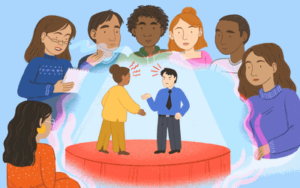In this article, we will discuss what experiential therapy is, who it can help, and why you might consider it. We’ll also provide some tips on how to find an experienced therapist who can help you begin your journey of self-discovery.
Contents
Understanding Experiential Therapy

Experiential therapy is a type of psychotherapy that focuses on helping people to understand and experience their emotions. The goal of experiential therapy is to help people become more aware of their inner thoughts and feelings so that they can learn to cope with them healthily.
Theory Behind Experiential Therapy
Experiential therapy is based on the idea that our emotions are best understood when we experience them directly. This type of therapy uses experiential techniques to help people explore their emotions and feelings in a safe and supportive environment.
Experiential techniques can include things like journaling, art therapy, and role-playing. These techniques can help people to express their emotions in a way that is non-threatening and allows them to explore their feelings without judgment.
History And Development
Experiential therapy has its roots in the humanistic movement of the mid-20th century. This movement was based on the belief that humans can grow and change if they are allowed to do so.
Unfolding Experiential Therapy

Experiential therapy is a process of self-discovery that involves exploring your emotions and feelings in a safe and supportive environment. This type of therapy can help you to understand your inner thoughts and feelings so that you can learn to cope with them healthily.
Who Can It Help
Experiential therapy can be helpful for people who are struggling with emotional issues such as anxiety, depression, or stress. It can also be beneficial for people who have experienced trauma or abuse.
How Does It Work
Experiential therapy uses a variety of techniques to help you explore your emotions and feelings. These techniques may include role-playing, journaling, and art therapy. Experiential therapy is typically conducted in a group setting so that you can share your experiences with others who are going through similar issues.
Techniques Used In Experiential Therapy
Some of the techniques used in this therapy include:
- Role-playing: This technique involves acting out different scenarios to explore your emotions and feelings.
- Journaling: This technique involves writing down your thoughts and feelings in a journal so that you can reflect on them later.
- Drama therapy: This technique involves using drama and storytelling to explore your emotions and feelings.
- Music therapy: This technique involves using music to help you express your emotions and feelings.
- Art therapy: This technique involves using art to express your emotions and feelings. Art therapy can be beneficial for people who struggle to express their emotions verbally.
Evaluating Experiential Therapy

Experiential therapy is typically evaluated based on the progress that you make during therapy. Your therapist will work with you to set goals and objectives so that you can track your progress over time.
Benefits of Experiential Therapy
Some of the benefits of this therapy include:
- Helping you to understand and experience your emotions.
- Allowing you to explore your emotions in a safe and supportive environment.
- Providing you with tools and techniques that you can use to cope with your emotions healthily.
- Helping you to make progress towards your goals and objectives.
Limitations of Experiential Therapy
Some of the limitations of this therapy include:
- It can be difficult to find an experienced therapist who is trained in this type of therapy.
- You may need to travel to a different location to find a qualified therapist.
- Experiential therapy may not be covered by your health insurance.
Why Consider It
If you are struggling to cope with your emotions, experiential therapy may be a good option for you. This type of therapy can help you to understand and experience your emotions in a safe and supportive environment. Additionally, this therapy can provide you with tools and techniques that you can use to cope with your emotions healthily.
Finding an Experiential Therapist

If you have an interest in pursuing this therapy, there are a few things that you should keep in mind.
How To Find One
When searching for an experiential therapist, it is important to find someone who is experienced and qualified.
- You can contact your local mental health association, or
- Search online for therapists who specialize in experiential therapy.
- You can also ask your doctor for a referral.
What To Look Out For
When you are looking for an experiential therapist, there are a few things that you should keep in mind.
- First, make sure that the therapist is qualified and experienced. You can ask the therapist for their credentials, or you can contact your local mental health association to verify their qualifications.
- Another thing to keep in mind is whether or not the therapist uses a variety of techniques. Experiential therapy should involve more than just one technique, such as journaling or art therapy. The therapist should also be willing to use different techniques depending on your needs.
- Finally, make sure that the therapist is someone you feel comfortable with. You should be able to trust and open up to the therapist so that you can get the most out of therapy.
Red Flags To Avoid
When you are looking for an experiential therapist, there are a few red flags that you should avoid.
- First, avoid therapists who only use one technique, such as journaling or art therapy. Experiential therapy should involve more than just one technique.
- Second, avoid therapists who are not willing to use different techniques depending on your needs. The therapist should be flexible and adaptable so that they can meet your needs.
- Finally, avoid therapists who you do not feel comfortable with. You should be able to trust and open up to the therapist so that you can get the most out of therapy.
Pursuing Training In Experiential Therapy
If you have an interest in pursuing training in this therapy, there are a few things that you should keep in mind.
- First, make sure that the training program is accredited. You can contact your local mental health association to verify the accreditation of the program.
- Second, make sure that the training program is approved by your state’s licensing board. You can contact your state’s licensing board to verify their approval.
- Finally, make sure that the training program is a good fit for you. You should be able to trust and open up to the trainers so that you can get the most out of the training.
NOTE: We invite you to list yourself on Therapy Mantra’s Experiential Therapist Directory.
Conclusion
Experiential therapy is a type of psychotherapy that is effective in treating emotional issues such as anxiety, depression, and stress. It can also be helpful for people who have experienced trauma or abuse. If you are considering this type of therapy, it is important to consult with a mental health professional to determine if it is right for you.
A Word From Therapy Mantra
Your mental health — Your psychological, emotional, and social well-being — has an impact on every aspect of your life. Positive mental health essentially allows you to effectively deal with life’s everyday challenges.
At TherapyMantra, we have a team of therapists who provide affordable online therapy to assist you with issues such as depression, anxiety, stress, workplace Issues, addiction, relationship, OCD, LGBTQ, and PTSD. You can book a free therapy or download our free Android or iOS app.


